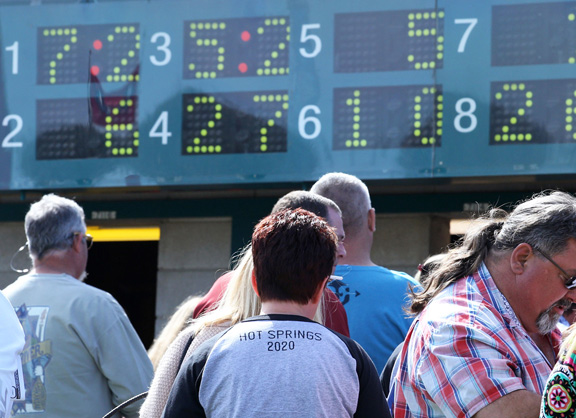By Pat Cummings
This text is an abridged version of today's Free Data Friday release from the Thoroughbred Idea Foundation. Read the full version here.
As the famous proverb goes–the best time to plant a tree was 20 years ago. The second-best time is now.
Despite few tracks going forward in recent weeks and little to no competition for wagering, Oaklawn and Gulfstream have reduced purses, blaming the loss of subsidies from now shuttered casinos and the lack of on-track handle. Oaklawn set a new record for single day handle last Saturday, with more than $16.8 million bet and significantly surpassing the comparable day a year ago–Arkansas Derby day–which saw handle of $11.7 million and a crowd of 45,000.
When asked earlier this week, just days after the record haul if Oaklawn could possibly extend their meet, track president Louis Cella said “we have no purse money left.”
How is this possible?
The unnatural situation created by the pandemic magnifies what has been obvious otherwise for far too long. Racing's funding model is completely counter to modern customer behavior. In 1996, roughly 75% of all bets on American races were made “off-track,” but often in brick-and-mortar simulcast facilities. In 2019, that number increased to 92%, but a significant amount came through advanced deposit wagering accounts online (ADW).
Horsemen receive a miniscule, but varied, amount from bets made via ADWs. They earn a more significant percentage when bets are made on-track, in-person. It should be noted that a few jurisdictions have claimed bets made via ADWs while bettors are geo-located on-track, but it remains a minority.
So who is actually making the lion's share of the money?
The biggest beneficiaries of today's model are technology providers within the sport, but not “racing.” The shareholders of Flutter (TVG) and Churchill Downs Incorporated (CDI – Twin Spires) see the most benefit from the status quo, as do the private owners of The Stronach Group (TSG – Xpressbet). Together, these entities handled more than $4.1 billion together in 2019.
CDI and TSG also own two tote companies–United Tote and AmTote. Within this construct, these two industry behemoths have almost no incentive to modernize the tote, to offer new bet types, to introduce greater commingling opportunities, or to ensure betting market integrity.
Horse owners have no rights to the data generated by their own horses, nor their imagery. Tracks own racing's data through the TRA, in partnership with The Jockey Club, via Equibase. Owners and breeders relinquish such rights when registering their foals, a requirement to race.
Casino revenues have served as purse subsidies and generally hidden the long-term impact of this awful system for horse owners. As tracks and states closed their doors to keep customers at home, the extent of the decay within the system has become far clearer. We have relied on casino-funded purse subsidies far too much.
A pandemic comes along, closes the casino and grandstand for a few weeks, and horsemen have to make due with less initially, and potentially far more over the medium term.
It's time for a new model.
Horsemen should own an ADW, demand the most competitive rates, demand an investment in a modern tote, or fund the construction of a new tote system. Horsemen should prepare to buy or lease tracks for their own operation. They should gear up, mostly financially, for the protracted legal fights that have been avoided for far too long.
2020 should be the year that owners stop tolerating racing's long-broken funding model and started on a new path to make the sport far more sustainable for all of its stakeholders.
Unquestionably, casino behavior will change after the pandemic subsides. Horsemen must start acting now. The only guaranteed revenue for racing is from wagering ON horse races. It is beyond time that the people who own, race and breed horses got far more involved in renovating the funding model that keeps the sport operational.
These conversations have been ignored, particularly as horsemen have been endlessly sidetracked by Lasix and a federal bill.
If the sport's financial levers are not maximized to attract more owners and more players, it will contract–increasing the costs on all existing owners and players, decreasing the number of participants over time. There is no need to accomplish any of this with raising takeout. The opposite is probably true.
Horse owners and horseplayers can be aligned in the quest for a far better financial construct tied to the sport.
The best time to repair racing's flawed business model was 20 years ago.
The second-best time is now.
Not a subscriber? Click here to sign up for the daily PDF or alerts.






